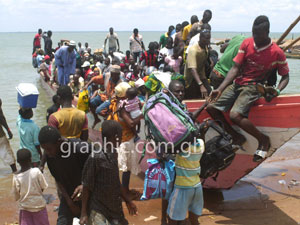 A law is to be passed to give the Ghana Maritime Authority (GMA) the needed legal backing to discharge its mandate effectively, the Director General of the GMA, Mr Peter Issaka Azuma, has said.
A law is to be passed to give the Ghana Maritime Authority (GMA) the needed legal backing to discharge its mandate effectively, the Director General of the GMA, Mr Peter Issaka Azuma, has said.
The existing laws on inland waterways transportation are currently out of date because Legislative Instrument (LI) 862 of 1974 mandates the Volta River Authority (VRA) as the sole agency responsible for regulating lake transportation in the country, but the VRA no longer has that mandate.
According to Mr Azuma, with the passage of the GMA Act 2002 (Act 630), the authority was now in charge of all inland water transportation, including the Volta Lake, for which reason he underlined the need for the subsidiary legislation to be expedited.
He said this at Yeji in the Pru District the Brong Ahafo Region when he led a team of officials from the GMA to the area to emboss load lines on boats that ply the Volta Lake in an effort to check accidents on the lake.
The Volta Lake, in recent years, has claimed many lives as a result of failure by boat operators to adhere to navigation regulations.
A draft law has been prepared to replace LI 862. The law is based on the 2002 International Maritime Organisation (IMO) Model Regulations for Inland Waterways Vessels and Non-Convention Vessels Operating in Africa.
It is being reviewed to address issues raised at a previous stakeholders’ forum before it is sent to the Attorney-General’s Department for promulgation.
The law prescribes the licensing of boats, the certification of boat operators and boat mechanics and the proper design and construction of boats.
Upon the promulgation of this law, a law will also be enacted to establish Lake Traffic Control Units that would provide local presence at boat centres and enforce lake safety standards, among other things.
Mr Azuma explained that the new regulations on inland waterways would overhaul the existing legislation on inland waterways transportation, including the Volta Lake, which had become obsolete and defective.
“The new regulations will impose the need for boat owners to have licence before they can operate and the certification of licensed boat operators,” the director-general stated.
Touching on training courses for boat operators, he said the GMA recently began an exercise to train boat operators and outboard motor mechanics, citing crew or operator incompetence as one of the major causes of accidents.
The initial programme, he averred, covered six boat centres, including Yeji, and stressed that more than 690 people had benefited from the programme with 151 of them from Yeji.
Mr Azuma noted that it was the policy of the GMA to issue certificates to only trainees and urged those who were yet to be trained to submit their names and other particulars for arrangements to be made for them.
In view of the success story of Yeji, he stated that more Naval Task Forces (NTFs) had been stationed at five additional boat stations along the Volta Lake- two of which were stationed at Jewi Wharf and Newtown Wharf on the Abbey Lagoon at Half Assini in the Western Region.
The additional boat stations served with NTFs on the lake are Dzemeni, Kete Krachi, Dambai, Tapa Abotoase and Kpando Torkor.
The duties of the NTFs are to check the loading of boats to ensure that they are not overloaded, check unruly behaviour among boat operators and help to maintain environmental cleanliness at the waterfront.
Mr Azuma called on the Volta Lake Company, the VRA and other allied organisations operating any means of transport on the lake to ensure that they were licensed with high safety integrity.
Story: Sebastian Syme
Newer news items:
Older news items:
